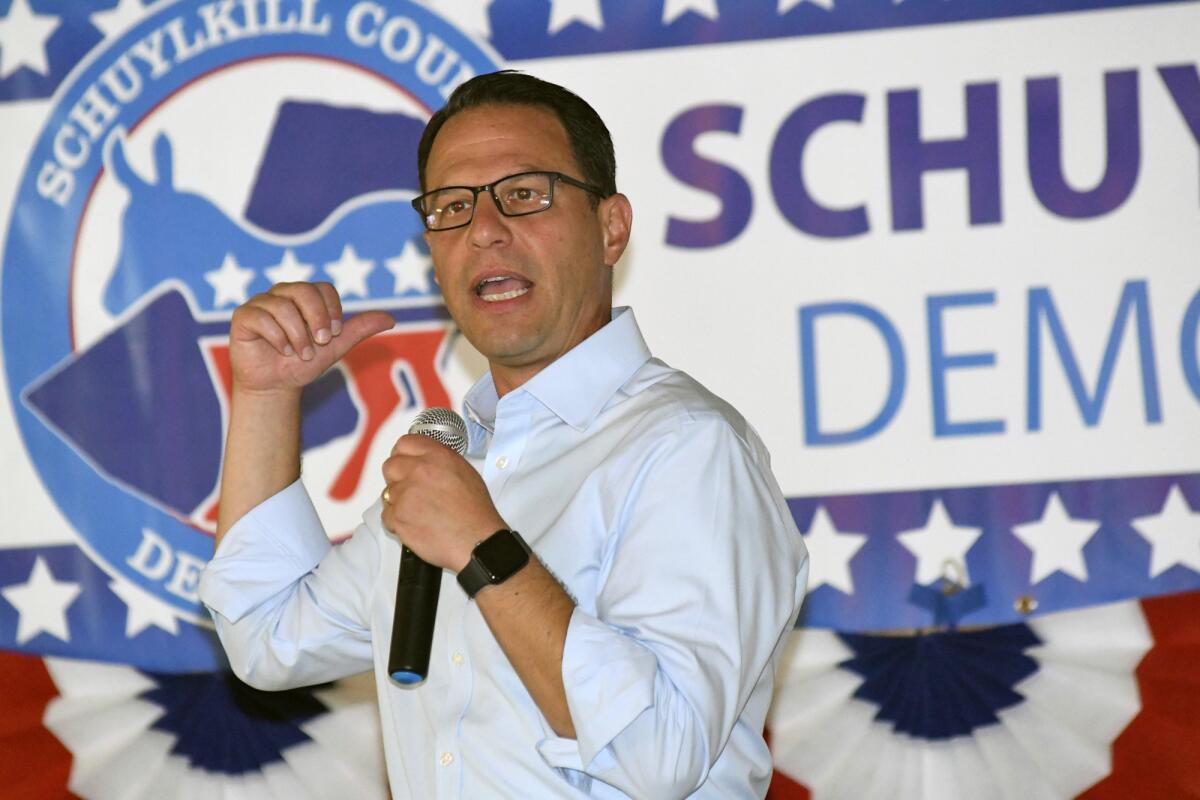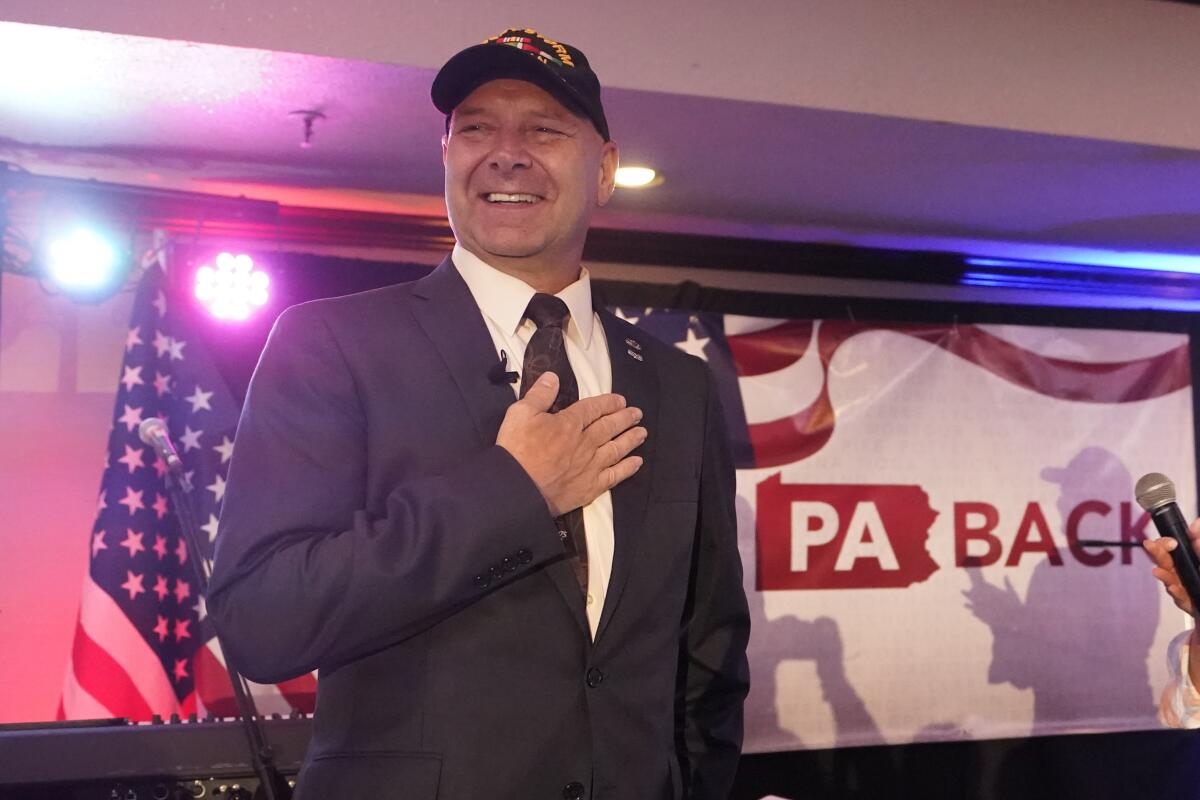Essential Politics: Why are Democrats buying ads for far-right candidates?

WASHINGTON — Democratic candidates have warned their Republican opponents are dangerous. They say these far-right candidates will roll back reproductive rights, imperil voting rights and threaten democracy. And yet, all over the country, Democrats are buying ads in Republican primaries in the hopes of boosting GOP candidates with the most extreme views and records.
It’s a strategy, Democrats contend, that will give them better chances in general elections that are forecast to be disastrous for their party. Experts say it’s a risky strategy that provides a platform to far-right conspiracy theorists who threaten American democracy. Supporting the election prospects of candidates Democrats claim are a danger to democracy has also been criticized as being hypocritical.
Hello, besties. I’m Erin B. Logan, a reporter with the L.A. Times. I cover the Biden-Harris administration. Today, we will discuss the risks Democrats are taking by engaging in this electoral strategy.
Get our L.A. Times Politics newsletter
The latest news, analysis and insights from our politics team.
You may occasionally receive promotional content from the Los Angeles Times.
The backhanded ads
Democratic groups around the country have spent millions on ads that, at first glance, seem to criticize Republicans running for office by touting their conservative positions and ties to former President Trump. But the ads actually aim to make them more appealing to core Republican voters.
In Illinois, for example, the Democratic Governors Assn. purchased ads that called state Sen. Darren Bailey‘s agenda “too conservative for Illinois” during his Republican primary. The ad notes that Bailey is “100% pro-life,” is a member of the National Rifle Assn. and “opposes liberal gun control.”
“Bailey wants to ban abortions,” the ad says. “And Bailey proudly embraces the Trump agenda, calling into question our elections and fighting for gun owners and the unborn.”
Bailey won his primary.
Democratic ads also targeted Pennsylvania state Sen. Doug Mastriano, who was running in the GOP gubernatorial primary. The ads warned that Mastriano wants to ban abortion, “lead the fight to audit the 2020 election” and is closely aligned with Trump. “If Mastriano wins, it’s a win for what Donald Trump stands for. Is that what we want in Pennsylvania?” stated an ad, which was paid for by the campaign of Josh Shapiro, gubernatorial Democratic candidate and the state’s attorney general.
Mastriano won his primary.
Democrat Josh Shapiro spent heavily to boost MAGA Republican Doug Mastriano in Pennsylvania governor’s race. The strategy was workshopped in California.

The House Majority PAC, a group formed to help Democrats expand their majority in the U.S. House of Representatives, paid for an ad that promoted Chris Mathys, a staunch conservative who ran against Rep. David Valadao, a moderate in California’s 22nd district. The ad called Mathys “a true conservative. 100% pro-Trump and proud” and noted that Valadao voted to impeach Trump.
“Same label, so, Republicans gotta check the ingredients,” the ad said.
Valado eeked out a victory, despite Democrats’ best efforts.
Why are Democrats spending so much money in these and other such races? They are in trouble. History, economic trends and President Biden’s low approval ratings are setting the stage for a very tough midterm election season. Democrats are hoping to get every advantage they can. One way to tilt the playing field in their favor is to face candidates in the general election that will not be palatable to swing voters.
In 2010, Democrats faced a similarly difficult environment but managed to hold onto the Senate because Republicans nominated polarizing candidates who ran poor weak campaigns.
Our daily news podcast
If you’re a fan of this newsletter, you’ll love our daily podcast “The Times,” hosted every weekday by columnist Gustavo Arellano, along with reporters from across our newsroom. Go beyond the headlines. Download and listen on our App, subscribe on Apple Podcasts and follow on Spotify.
Does the strategy work?
Jim Kessler, executive vice president for policy at Third Way, a Washington-based center-left think tank, said that the strategy makes sense.
Kessler noted that in 2010, Nevada Democratic Sen. Harry Reid employed similar tactics to ensure in the general election he faced a weaker candidate, Sharron Angle, a state lawmaker and a staunch conservative.
Reid won that race.
But it was a risky bet for Democrats.
“If it doesn’t work, you end up getting radicals elected to Congress” and other offices, Kessler said.
Sarah Longwell, a GOP strategist, said she is “deeply concerned about the quality of the Republican candidates” this election cycle.
Longwell said many candidates — such as former athlete and current Georgia Senate candidate Herschel Walker — are backing Trump’s unfounded voter fraud claims and that “that’s extremely dangerous.”
“It is a very scary environment to have this many people running for office at the state and federal level who won’t [commit to] certify the election in 2024,” Longwell said.
Longwell said the Democratic strategy is flawed because Republicans “seem perfectly capable of nominating far-right extremist candidates all on their own without any help from Democrats.”
“The chances are just as good that you end up electing a bunch of crazy people,” she said. “Democrats are playing with fire.”
Enjoying this newsletter? Consider subscribing to the Los Angeles Times
Your support helps us deliver the news that matters most. Become a subscriber.
The latest from the Jan. 6 investigation
— Stephen K. Bannon, a former White House strategist and Trump ally, has told the House committee investigating the Capitol riot that he is now willing to testify, the Associated Press reported. Bannon’s turnabout was conveyed in a letter late Saturday from his attorney, lawmakers said, as the committee prepares to air some of its most striking revelations yet this week against Trump in what may be its final set of hearings. Bannon faces criminal charges for defying a congressional subpoena in the matter, and he is scheduled to stand trial on Monday.
— The ties between Trump allies and the far-right extremists who attacked the Capitol on Jan. 6, 2021, was the focus of Tuesday’s hearing by the House committee investigating the insurrection, Times writer Sarah D. Wire reported. The hearing could be one of the most consequential held by the panel.
— Television critic Lorraine Ali unpacks how the Jan. 6 hearings set the stage for a stunning prime-time finale. A “disciplined approach has allowed the hearings to shift with breaking news and new testimony as needed without losing momentum (see last month’s questioning of Cassidy Hutchinson), while also organizing the chaos around the 2020 election and its aftermath into a gripping chronology of events,” she writes.
The view from Washington
— A month after he boycotted a major regional summit in Los Angeles and snubbed the Biden administration, Mexico’s President Andrés Manuel López Obrador came to Washington on Tuesday for wide-ranging talks with his U.S. counterpart, Times writers Tracy Wilkinson and Eli Stokols reported. The White House has sought to downplay the lingering tensions and U.S. frustrations ahead of talks between Biden and López Obrador that White House officials see as key to addressing immigration, crime and the economy.
— The Biden administration on Monday told hospitals that they must provide abortion services if the life of the mother is at risk, saying federal law on emergency treatment guidelines preempts state laws in jurisdictions that now ban the procedure without any exceptions following the Supreme Court’s decision to end a constitutional right to abortion, the Associated Press reported.
— Biden signed an executive order Friday aimed at protecting women’s reproductive rights, a response to rising pressure from within his party to address such protections with greater urgency and conviction, Times writer Eli Stokols reported.
— First Lady Jill Biden apologized Tuesday for saying Latinos are as “unique” as San Antonio breakfast tacos during a speech to the nation’s largest Latino civil rights and advocacy organization, the Associated Press reported. The first lady flew to San Antonio on Monday to address the annual conference of a Latino civil rights and advocacy group. Her attempt to compliment Latino diversity didn’t go over very well. She also badly mispronounced “bodegas,” small stores in urban areas typically specializing in Latino groceries.
The view from California
— Nearly two decades ago, California voters passed a landmark tax on millionaires envisioned as a game changer for mental health, and its supporters promised the new money would drastically reduce homelessness and improve access to services for all Californians, Times writers Jessica Garrison, Melody Gutierrez and Jackeline Luns reported. Since voters approved the tax in 2004, it has generated an escalating gusher of money — $29 billion in total, half of which has come in just the last five years. But amid a steadily worsening homeless crisis, it’s clear the results have fallen far short of the initial promise.
— Former Rep. Katie Hill, who owes hundreds of thousands of dollars to media parties she unsuccessfully sued over the publication of salacious pictures while she was in office, has filed for bankruptcy protection, Times writer Seema Mehta reported. If successful, the move could allow the California Democrat to avoid paying attorneys’ fees to the defendants, including a conservative website, a British tabloid and two journalists. The financial judgments were rendered in 2021 after a judge dismissed her lawsuit accusing multiple parties of distributing and publishing intimate pictures of Hill without her consent.
— Less than a month after the U.S. Supreme Court ruled against restrictions on carrying firearms in public, California Gov. Gavin Newsom has signed at least three major gun control measures into law to restrict access to the weapons and create an avenue for private citizens to sue the industry. On Tuesday, Newsom signed one of the highest-profile bills, Hannah Wiley writes.
The view from the campaign trail
— A conservative activist who sought a hand recount of a rural Northern California election that his candidate lost in a landslide defeat called it off Monday, a day before it was set to begin, Times writer Hailey Branson-Potts reported. Randy Economy — a leader of the unsuccessful Republican-backed effort to recall Gov. Gavin Newsom last year — requested a recount last week in the race for Nevada County clerk-recorder and registrar of voters, part of a right-wing movement to take control of local and state election apparatuses across the nation. Natalie Adona won the race last month with 68% of the vote, nearly 15,000 votes ahead of Jason Tedder, who came in second place.
— The Democratic National Committee is launching a digital ad campaign to energize its voters after last month’s Supreme Court decision overturning Roe vs. Wade, warning that Republicans’ ultimate goal is to outlaw abortion nationwide. The committee is sponsoring a $10,000 ad buy beginning Tuesday on the websites of more than 20 lifestyle publications.
Sign up for our California Politics newsletter to get the best of The Times’ state politics reporting. And don’t forget to follow me on Twitter for updates about my adorable dog Kacey and to share pictures of your adorable furbabies with me at [email protected].
Stay in touch
Keep up with breaking news on our Politics page. And are you following us on Twitter at @latimespolitics?
Did someone forward you this? Sign up here to get Essential Politics in your inbox.
Until next time, send your comments, suggestions and news tips to [email protected].
Get the L.A. Times Politics newsletter
Deeply reported insights into legislation, politics and policy from Sacramento, Washington and beyond. In your inbox three times per week.
You may occasionally receive promotional content from the Los Angeles Times.





